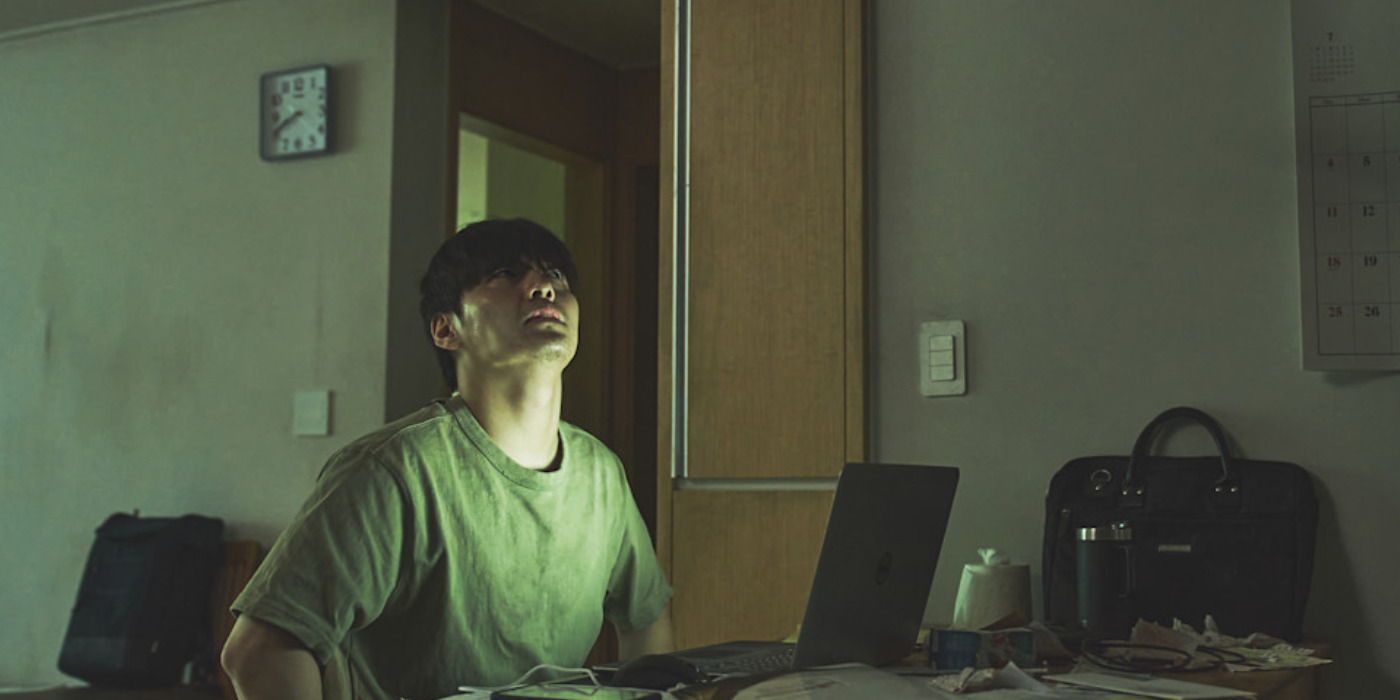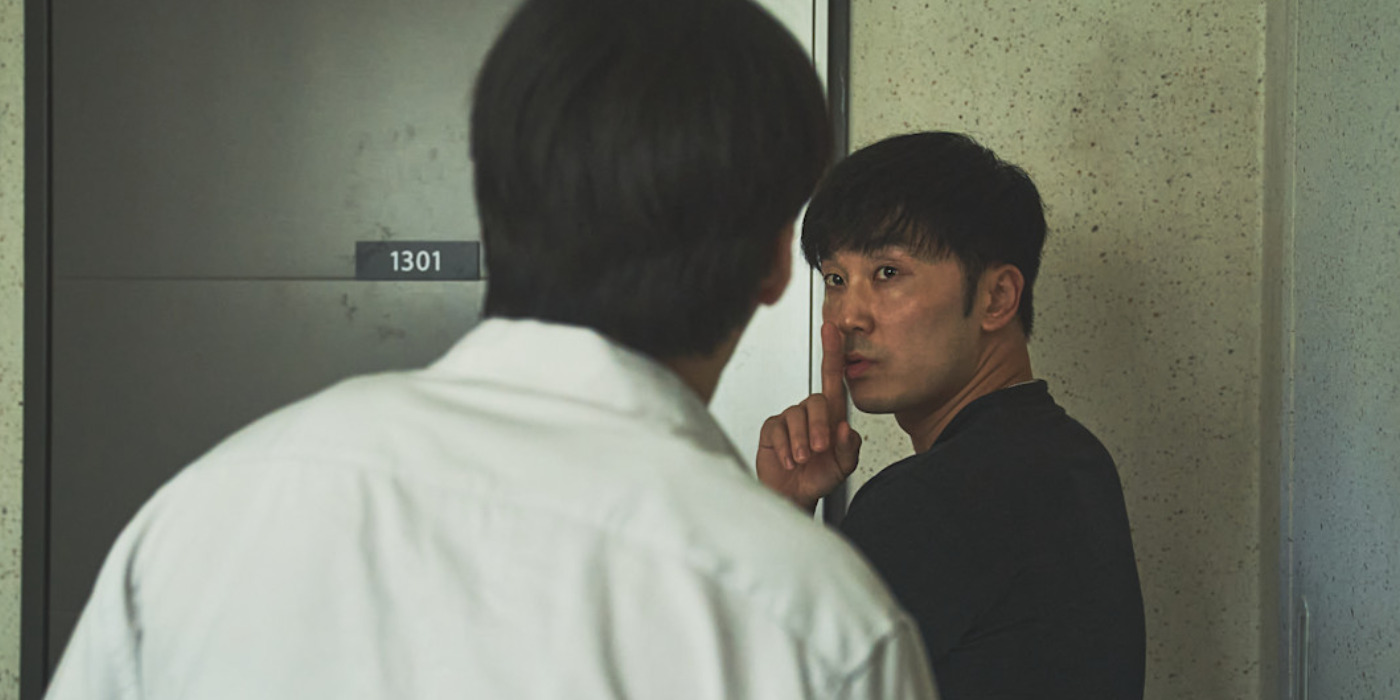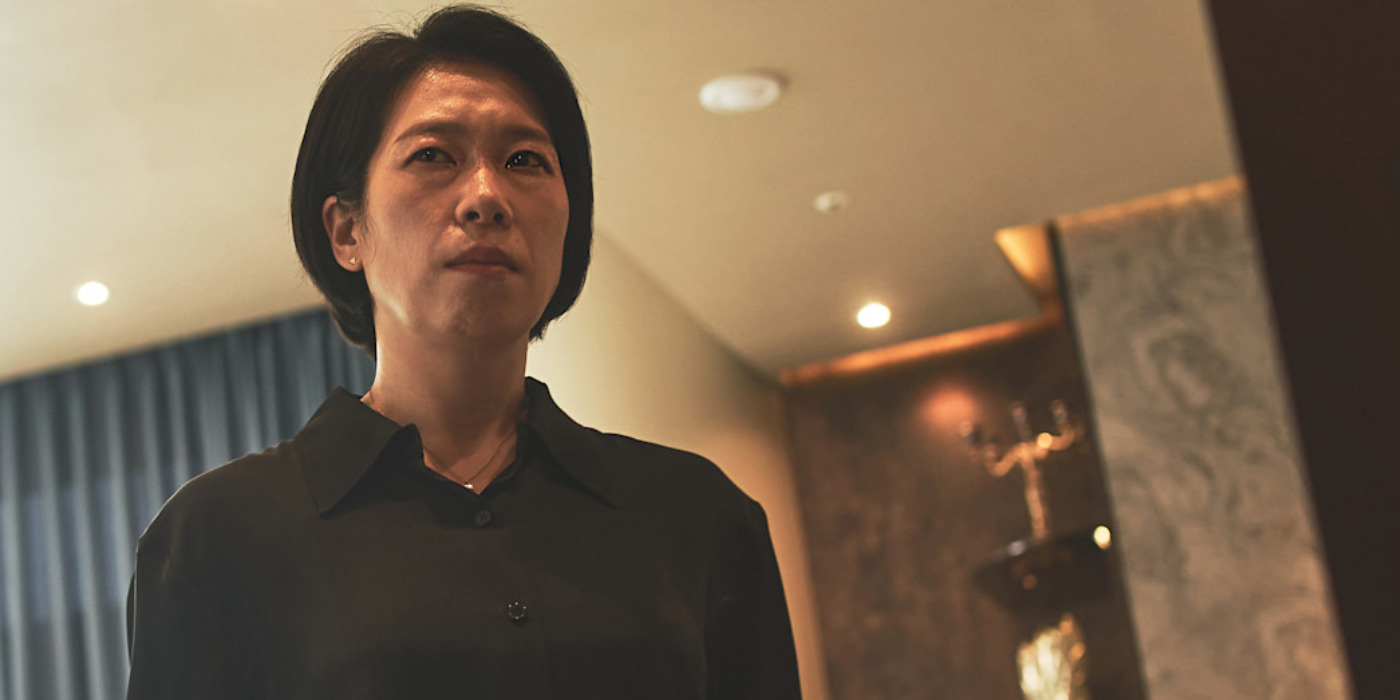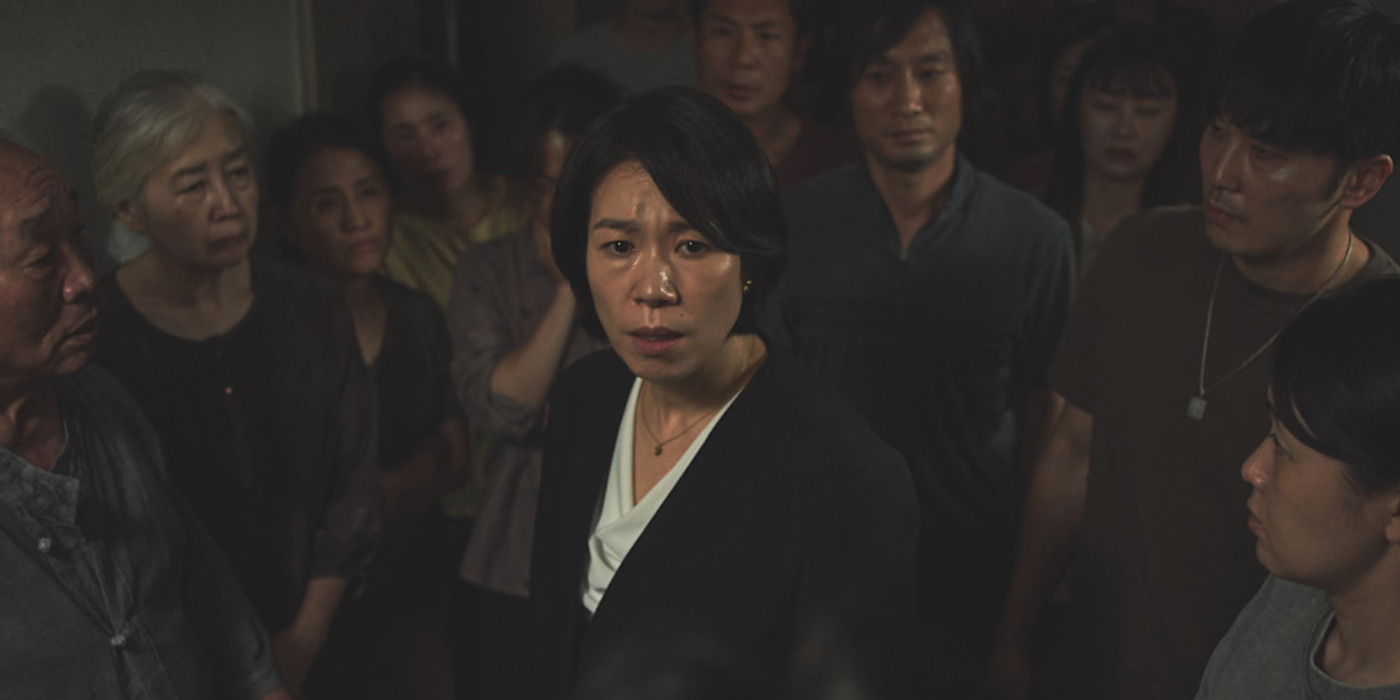Netflix’s Kdrama film ‘Wall to Wall’ presents a thrilling story about a young man whose noisy neighbors slowly but surely drive him to the brink of insanity. In his 30s, Woo-sung becomes a proud homeowner in the heart of Seoul. Despite the mountains of debt he accumulated along the way, he’s happy with this accomplishment. That is, until a handful of years pass and the mounting loans finally catch up to him. The ensuing frustration becomes all the more aggravated thanks to the noise of his surrounding neighbors consistently plaguing his apartment unit. Eventually, as a bad crypto bet sets his life up for ruin, Woo-sung decides to fix his problems by teaming up with his upstairs neighbor, Jin-ho, and investigating the source of the grating noise. Inadvisably, this leads him down a rabbit hole that promises a fate worse than financial ruin. SPOILERS AHEAD!
Wall to Wall Plot Synopsis
In 2021, Woo-sung, a young office worker, gathers enough money through savings and loans to buy his very own apartment at the Royal City Sileos Complex. In the Seoul real estate market, the property promises to be greatly beneficial, in part because of the new GTX Line that is set to be built in the neighborhood. Nonetheless, three years later, in 2024, debt-ridden homeowners like Woo-sung face a bleak future. House prices have drastically dropped, and the train line’s future remains frustratingly precarious. Therefore, the office worker, who can’t stay on top of his bills despite working two jobs, remains stuck in a purgatory of sorts. Selling off property remains a tough gamble since there’s always a chance the market could pick back up again. On the other hand, holding out long enough for that to happen only resulted in more bills.

Thus, Woo-sung goes from poor to house-poor, which is only marginally better in terms of development. One of his colleagues and close friends, Chang-wu, is in a similar situation, only with crypto investments. However, after one night of drinks with a retiring colleague, the latter claimed to have cracked the code to the game. Apparently, he managed to get his hands on exclusive information that dictates how a certain stock will act in the future. If one hedges their bets accordingly, they can hope to make 800 times in profit. Initially, Woo-sung remains skeptical about the entire thing, knowing how easy it could be to lose everything in the blink of an eye. Nonetheless, he reaches the end of his thread as things at home continue to grow worse and worse. An onslaught of noise continues to afflict his apartment, making it impossible to get a single moment of peace even when asleep.
Worse yet, Woo-sung’s downstairs neighbors from apartment 1301 seem to insist the noise is coming from his unit. When he tries to find out the source of the noise by checking on his upstairs neighbours, no one is ready to take the blame for it. Yet, Eun-hwa, the resident representative, who is liberal with monetary compensations, only encourages him to ride out the next few months before the renters at 1301 could be evicted. Thus, an amalgamation of all these troubles leads Woo-sung to a risky road. He decides to sell his apartment to the first buyer overnight to make some quick money. Later, he invests all the earnings in the crypto investment, planning on selling them off at their peak as Chang-wu instructed.

Nonetheless, the dangerous gamble and the incessant noise in his apartment inevitably drive Woo-sung to his limits. Furthermore, the entire building begins to believe his unit is the source of the noise, to the point where they form a mob outside his door. To make matters worse, an inspection of his unit reveals hidden speakers that are discovered to be responsible for the constant racket. Inevitably, things get out of hand, and Woo-sung gets in a fight that lands him in handcuffs at the police station. Thus, he misses out on the opportunity to sell his investments and make bank, effectively losing everything in a matter of seconds. This almost drives him to suicide, until a fraught confrontation with Jin-ho compels him to change his mind. The duo realizes that they can change their fates if only they can uncover the true source of the grating sounds.
Wall to Wall Ending: Who is Responsible for the Noise?
The neighborly noise remains a crucial part of what drives Woo-sung toward his ultimate ruin. The tumultuous nature of the real estate market and the subsequent financial pressure certainly add a strain to Woo-sung’s life, making it hard to get through another day without collecting more and more debt. However, it’s the constant noise that relentlessly tortures the young man and makes him manic at the worst of times. The crypto gamble, though risky, could have led to a high reward if only the never-ending noise hadn’t suffocated Woo-sung inside his own house. In the end, the noise-driven confrontation between him and his neighbors causes such wreckage in his life that he considers committing suicide. Having sold his house and possibly ruining his career, the young man has little else to live for. For the same reason, his will to live is restored when he stumbles upon an opportunity to undo the worst of his mistakes.

A peek into apartment 1301 reveals that their unit is owned by the same people who bought Woo-sung’s house from him. In fact, they’re also the same people who invested in Jin-ho’s deposit. Thus, it seems the same people are in control of three entire floors. Consequently, the duo concludes that the people at the top have a lot to gain from driving away their homeowners and renters to establish a monopoly on the properties. This would be especially fruitful due to the recent confirmation of the GTX Line’s upcoming construction. Nonetheless, one piece of evidence quickly dismantles this theory. After agreeing to work with Jin-ho, Woo-sung notices an instrumental detail about the phone that was hidden in his apartment, to emulate all the noises. The phone is connected to a wi-fi network within the building that doesn’t belong to unit 1501. As such, the culprit behind the installation of the sound speakers can be identified by tracing the wi-fi connection back to them.
To Woo-sung’s horror, the wi-fi leads back to none other than Jin-ho. Consequently, everything begins to fall into place. Jin-ho, his upstairs neighbor, has always been behind the noises from the very start. Although the office worker doesn’t know it, the other man even breaks into his apartment one night while the former is sound asleep with his ears plugged. He uses this opportunity to not only learn about his Liberation Day Crypto plans but also to install the sound speakers in his apartment. Furthermore, Jin-ho had also partnered up with the 1301 residents, promising to get the family’s renter’s lease extended in return. As such, together the two units sandwiched Woo-sung in a torture chamber of noise while gaslighting everyone into thinking he himself was to blame for the racket. In this scenario, the noise is equipped as a tool representative of power and control.
Why Does Woo-sung Laugh in the Ending Scene?
In the end, Jin-ho’s mask is uncovered, and Woo-sung exacts his own personal revenge on his aggressors. Still, the young man finds himself back inside his apartment once again. Even though his downstairs and upstairs neighbors, the source of the aggravating noises, are gone, the protagonist still hears the grating clamor around him. As a result, he breaks into hysterical, helpless laughter just before the story comes to an end. This can be interpreted in a number of ways. Initially, the themes of the narrative shape noise as a concept and a storytelling tool. As such, it can be seen as an allegory for the complications of the growing socio-economic pressures and anxieties plaguing the young generation. Woo-sung’s terrible financial situation and his poor economic standing in society create many hurdles around him.

Since Jin-ho’s plan coincides with Woo-sung’s economic ruin, almost by design, the noise becomes a constant companion to the same concept. It is a reflection of the protagonist’s jumbled mindset, aggravated by the crushing real estate market and his precarious status as a debt-ridden homeowner. For the same reason, the noise effectively embodies two different things: the building, which can be pitched as a stand-in for Jin-ho’s nefarious plot, and the people, a representation of society’s deafening complications. Ultimately, Woo-sung manages to overpower the former by getting rid of his adversaries in a raging fire. However, at the end of the day, he’s still left with the reality of his existence, a cog in the wheels of capitalism, haunted by his growing debt. Thus, when the noise continues to follow Woo-sung without rhyme or reason, he has no choice but to laugh at his sorry, pitiful reality.
Why Did Jin-ho Frame Woo-sung? What is His Plan?
Initially, when the penthouse owners are Woo-sung’s primary suspects, he has a motive figured out for them from the get-go. Nonetheless, the protagonist learns of his actions before their driving force when it comes to Jin-ho. His quest to match his neighbor’s wi-fi with the phone traps the office worker inside the former’s apartment. There, he learns all of his secrets, such as the noise-making room and the hacking system that allows him to spy into every resident’s apartment through the intercom. As it turns out, the journalist has a widespread plan in action. He wants to uncover the truth behind noise pollution, an issue that is overwhelming Seoul and the entire country. In fact, just a few weeks earlier, a murder had taken place in the nearby building with noise complaints as the originating issue.

Therefore, Jin-ho is planning on putting together a story about its hazards with the Royal City Sileos Complex as the central test subject. However, instead of conducting actual research, he already knows what narrative he wants to tell. The journalist is eager to pen a story about a tenant losing his mind thanks to the building’s many structural problems and faults that manifested most torturously as noise. He then wants the story to frame the tenant as a crazed killer who murdered everyone in the complex, leaving Jin-ho as the sole survivor. In the aftermath, the journalist would divulge his findings, complete with resident interviews and other photographic evidence, to bring the damaging potential of noise damage to the world.
It is entirely by happenstance that Woo-sung is the perfect victim to be cast into the role of the crazed tenant. As a young homeowner with loads of debt to his name, he simply inhabits the ideal demographic to become the messenger of Jin-ho’s story. For the same reason, since nothing distinguished him as the perfect victim, Woo-sung manages to get out of the dangerous predicament. In the end, in a last-ditch survival effort, he convinces the other man to change his mind and employ him as a partner-in-crime to help him complete his mission. With the 1301 renter already dead, she can easily be replaced as the scapegoat and the psychopathic star of the journalist’s orchestrated show.
Does Woo-sung Kill Eun-hwa and Jin-ho? What Happens to the Ledger?
The end finds Woo-sung and Jin-ho in Eun-hwa’s penthouse apartment. As it turns out, Jin-ho requires a few more incriminating evidence to complete the arc of the story he wants to tell through his exposé. He seems convinced that this evidence can be found inside the Resident Representative’s locked steel door. It is only once he has the woman tied up and at his mercy that the reality of his anonymity to her reveals itself. Apparently, the journalist has picked Royal City Sileos as his target for a very specific reason. During her prosecutor days, Eun-hwa blocked a story from a promising journalist. The story was meant to be an exposé into the reality of the poor construction of Royal City Sileos. The journalist, Jin-ho, had risked his life to collect the necessary information, often crossing paths with thugs and the like.

Still, Jin-ho managed to complete his story and bring it to light. That is, until Eun-hwa decided to bury it for her own benefit. Shortly afterward, she gave up her position as a prosecutor and bought up the units in the Royal City Sileos apartment complex. Consequently, in an effort to understand why she would invest in a faulty building, the journalist followed her to the apartment and began spying on her. Thus, he discovered the truth about the ledger, which contains the names of all the construction workers who bribed Eun-hwa and helped her embezzle maintenance funds. Ultimately, Jin-ho wants to use this ledger to expose the truth of the construction industry and add weight to his story. Nonetheless, the journalist finds himself at a disadvantage in the altercation between him, Soo-wung, Eun-hwa, and her husband.
Soo-wung clearly doesn’t wish to be an accessory to Jin-ho’s maniacal crimes of mass murder. Therefore, he helps Eun-hwa in taking the latter down. This gives the ex-prosecutor a boost of confidence, which compels her to gloat about her wrongdoings and the ease with which she hid them. Nonetheless, time reveals the journalist’s defeat was only for show, and he ultimately kills the woman. Yet, he’s battered enough to be unable to walk away from the situation. Instead, Woo-sung is the only one who has any power in that situation. In the end, he chooses to put an end to the madness by burning the ledger and the papers in his house’s sale along with them. Thus, rather than fight for the cause like Jin-ho, he chooses his own self-preservation and leaves everything else behind. Afterward, he allows the cut gas line to blow the penthouse up into smithereens.
Read More: Brick Ending Explained: Where Did the Wall Come From?


